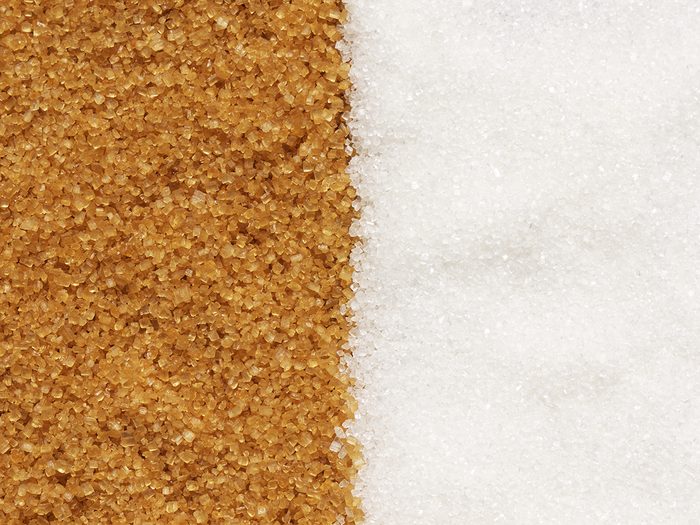What to Know About Your Sugar Intake

There’s a pretty good chance you eat too much sugar. Here's what a registered dietitian has to say about that.
Flavoured yogurt, granola, barbecue sauce, premade smoothies—it’s in everything. And not to pile on, but added sugar has been linked to serious health problems like high blood pressure, inflammation, diabetes, obesity and fatty liver disease, all of which increase your risk for heart attack and stroke.
To reduce their intake, many people have switched to sugar substitutes, which are plant-based or chemical substances that sweeten the flavour of foods and drinks without additional calories. But those substitutes also make headlines for various health risks. A 2023 study published in the journal Nature Medicine found that people who had a high concentration of erythritol (a common sugar substitute) in their blood were more likely to have a stroke or heart attack. Does this mean we’re better off switching back to plain old table sugar, or even health-haloed variations like coconut sugar or manuka honey? Not so fast.
“It doesn’t matter if you eat white sugar, brown sugar, honey, fruits or syrups—they all break down in the body into simple sugars and increase your blood sugar in pretty much the exact same way,” says Anisha Gupta, a registered dietitian in Mississauga. What’s more, “the sweetness from artificial sweeteners can trick your body into thinking it’s getting a blood sugar rise, but they don’t actually raise your blood sugar,” she explains. “For many people, that just means you end up with more sugar cravings later on, which means you may end up eating more sweets.” Great. But as for that recent study on erythritol, Gupta isn’t concerned. “The study shows a correlation, but not a causation, between erythritol and heart disease. The participants in the study were already at higher risk for heart disease, meaning that the results may not apply to everyone.”
Currently, there isn’t enough research to suggest that this particular substitute should be eliminated from your diet, though Gupta cautions that there’s room for more research on all sugary swaps. “My recommendation is the same as always: Enjoy the sweetener you like, but be mindful of how much you’re consuming, and look for ways to reduce, when it’s convenient.”
Here’s what you need to know:
The Limit
Ideally, we should consume no more than 48 grams of sugar per day, according to the Heart and Stroke Foundation. That’s not as much as you may think: A single Kit Kat bar contains 23 grams of sugar.
Hidden Sugars
Sugar creeps into seemingly unlikely foods, like pasta sauce, peanut butter and cured meats, making it even easier to surpass that 48-grams-per-day recommendation.
Pay Your Dues
A 2022 study by University of Alberta researchers pegs the economic burden of excessive sugar consumption in Canada at $5 billion a year, thanks to the direct and indirect costs related to 16 chronic diseases. One of their proposed solutions? Higher taxes nationwide on all sugar-added products (Newfoundland and Labrador has a head start).
“Healthy” Sugar
According to the British Dental Journal, coconut sugar retains some natural vitamins, minerals, fibre and antioxidants (unlike table sugar). But the nutrients have a minimal effect unless you consume large amounts, and by that point any benefit will be outweighed by all that sugar you’re eating.
Fructose Facts
Fruit has fibre, which helps the body digest food more slowly, so sugar from fruit will be absorbed more slowly, too. “There’s no need to avoid fruit because of the sugar content,” says Gupta. “No one is diabetic or has heart disease or obesity because they’ve eaten too much fruit.”
Next: The Healthiest Sugar to Eat, Bake With and Mix Into Your Tea, According to a Dietitian




